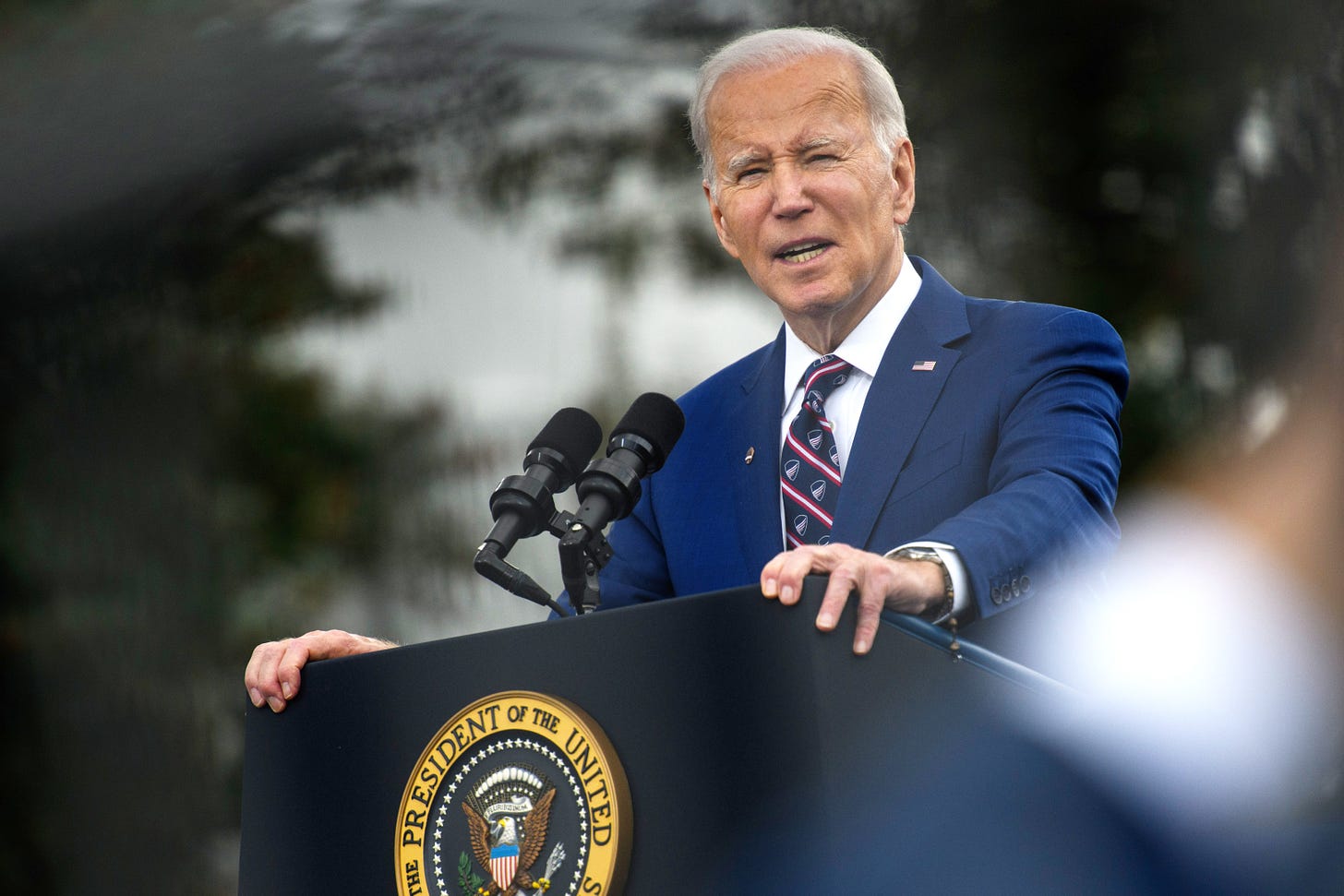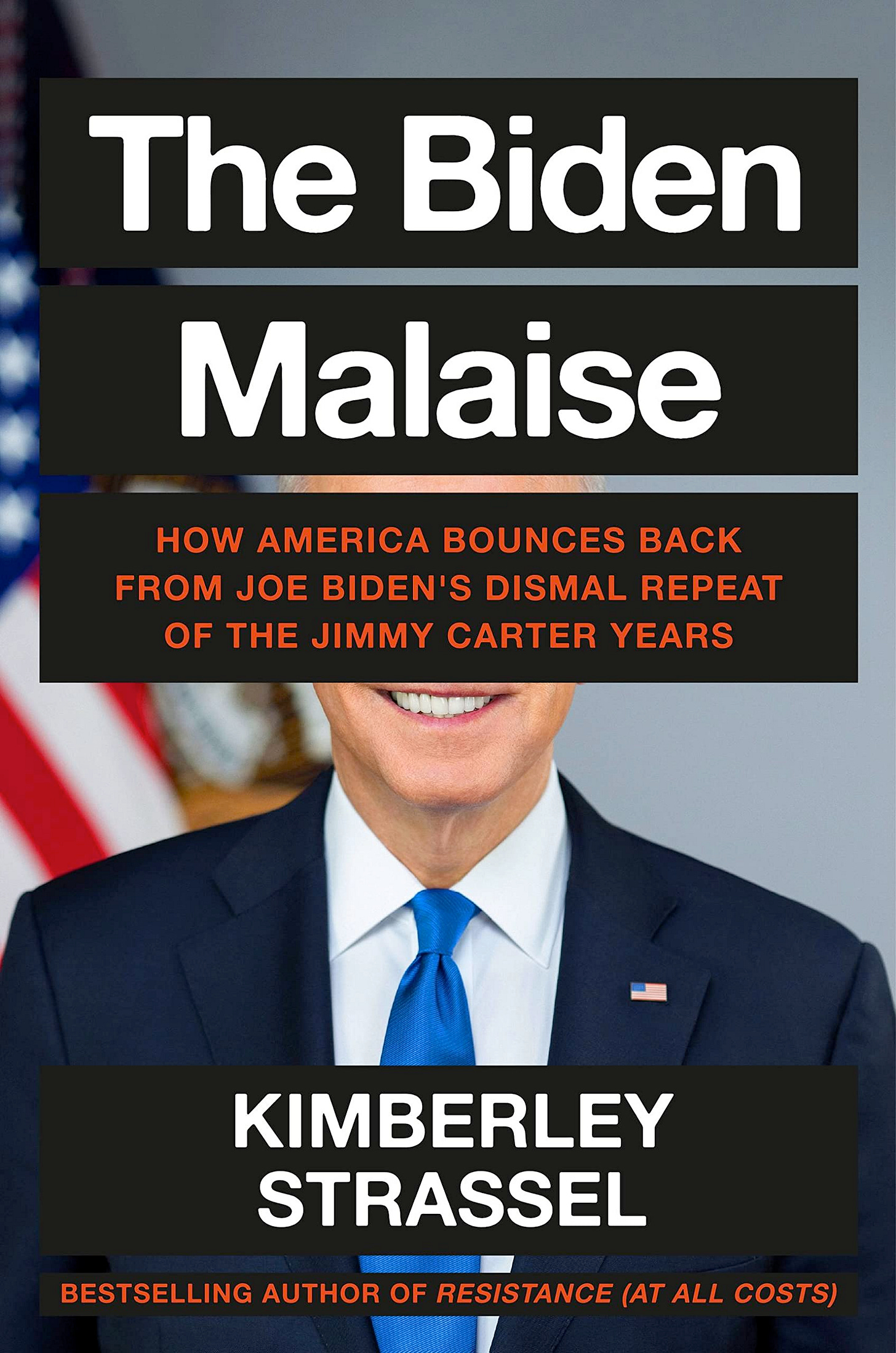Kim Strassel’s Disingenuous Biden Bashing
You don’t have to be blind to the sitting president’s flaws to see that his predecessor is much worse.
The Biden Malaise
How America Bounces Back from Joe Biden’s Dismal Repeat of the Jimmy Carter Years
by Kimberley Strassel
Twelve, 288 pp., $30
AS SOMEONE WHO LOATHES DONALD TRUMP to the marrow of my metatarsals, I picked up Kimberley Strassel’s new book, The Biden Malaise, with trepidation. Her previous book, after all, was titled Resistance (At All Costs): How Trump Haters Are Breaking America (2019). It was in part about people like me—and other Bulwark contributors—who leveled what Strassel considers spurious allegations to undermine the president she has praised to the skies.
Strassel is also a member of the Wall Street Journal’s editorial board and the author of a regular column, Potomac Watch, that came fiercely to Donald Trump’s defense in the Russia imbroglio, claiming (preposterously) that “there was never a shred of evidence of Trump-Russia collusion,” and earning her a place as one of Trump’s favorite columnists, someone about whom he tweeted positively on numerous occasions, and suggested that she be awarded a Pulitzer Prize.
Now that Strassel’s hero is no longer in office and campaign season is getting underway, she is back with the argument that Joe Biden is a terrible president, much worse even than Jimmy Carter.
What exactly is her case?
Strassel ranges over the issues of the day to show that Biden, like Carter, is “a subpar politician” and a policy failure. He came into office with an economy that was humming along with inflation at 1.7 percent. Overstimulating it with COVID relief funds and massive spending packages, inflation soared to 9.1 percent. Under Trump, the southern border of the United States was secure. Now it is being overrun by migrants. In foreign policy, Biden presided over a disastrous withdrawal from Afghanistan, and has slow-walked military assistance to Ukraine, letting its army bleed while keeping Kyiv from achieving victory.
Though nearly everything Strassel says about Biden comes straight from GOP talking points, perhaps because I am a former Republican myself, with lingering attachments to various Reaganite policy positions, I finished reading her volume feeling surprisingly persuaded by some of her points. On the evidence she presents, Biden, like Jimmy Carter before him, is a deeply flawed president.
But then, of course, there is all the evidence Strassel does not present.
Despite unremitting GOP opposition, and in this era of extreme polarization, Biden has some bipartisan accomplishments to his name, including the infrastructure bill, about which Strassel says the “GOP was too easily gulled into the deal.” The economy under Biden has been a job-creating engine, with unemployment at a fifty-year low and far exceeding Trump in the number of jobs created during his presidency. Indeed, thanks to COVID, three million jobs were lost under Trump. Whatever policy blunders Biden made that contributed to inflation, it cannot be ignored (though Strassel largely does ignore it) that inflation has been a worldwide phenomenon and blame cannot fairly be placed on Biden’s doorstep alone. In any event, the Federal Reserve has now brought inflation down to a 3 percent annual rate without inducing a recession (yet).
As for Ukraine, while one can agree with Strassel that Biden has been laggard in supplying advanced arms to Ukraine, she fails to acknowledge the mastery, against expectations, that Biden has demonstrated in leading the NATO alliance in support of Ukraine. It has been no small thing to steer a coalition of 32 counties through such a dangerous conflict. She also fails to acknowledge that, to the extent that there is opposition to American support for Kyiv, it comes from within her own party, where a growing contingent of MAGA Republicans would be all too happy to see Vladimir Putin prevail.
Nor does Strassel offer anything but praise for the “peace deal”—more aptly called a “surrender agreement,” as H.R. McMaster, Trump’s former national security advisor, put it—that Trump negotiated with the Taliban, pledging the withdrawal of all U.S. forces from Afghanistan by May 2021, and freeing five thousand Taliban and al Qaeda prisoners, all of which paved the way for Biden’s disastrous final act. Though one would not know it from Strassel’s disingenuous polemic, when it comes to Afghanistan, there is ample blame to go around.
HOVERING OVER THESE POLICY ISSUES is yet another highly pertinent subject that Strassel says almost nothing about: namely, Biden’s character as compared to that of his predecessor. I need not catalog for readers of The Bulwark the myriad ways in which the grifter-in-chief was an abomination, the worst president in American history by a mile. This sociopath, facing multiple criminal charges, and already found liable by a jury for rape, is now the prohibitive frontrunner for the 2024 Republican presidential nomination. It is worth noting the things that Strassel says and doesn’t say on this score.
Her highest praise for Trump is that he’s a fighter. She lauds him as a continuator of the program of the Great Communicator, Ronald Reagan. Apart from his positions on immigration and trade, she writes, “everything else about Trump . . . was straight out of the Reagan policy playbook.” Ninety percent of Trump’s agenda, she says, “was straight up, free market religion, direct from the gospel of Milton Friedman.” Waxing enthusiastic about Trump’s supposed policy achievements, Strassel says almost nothing in her book about the events of January 6th and Trump’s layered plan to steal the presidency.
To be sure, Strassel was not always silent on this score. On January 7, 2021, the day following the insurrection at the capitol, she did level a serious complaint against Trump in a column titled “Trump Erases His Legacy.” But contrary to what one might surmise from such a headline, her criticism was not so much for egging on a violent mob in the attempt to cling to power as for something else.
What ignited Strassel’s ire was the fact that Trump had contributed to the loss of two GOP Senate seats in Georgia’s special runoff elections and with them the loss of the Senate to Democratic control. Trump neglected to make clear “to his supporters that the only way to preserve [his] legacy was to keep the Senate in GOP hands.” This is a characteristic Strassel judgment. The institutions of democracy be damned; she’s a Republican partisan all the way down.
But Strassel is a particular kind of Republican partisan—as is revealed when she sometimes wanders off her main theme of bashing Biden to train her fire on some of her fellow GOPers, particularly the national conservatives. “The biggest threat to the nation, they argue,” she writes, “is cultural decay, and on that we must fight, fight, fight, and remain in a state of perpetual outrage.” But, she continues, “the biggest problem with the NatCons is that not a thing they offer is new. Americans who want bigger government and class warfare already have a party: Democrats.”
What’s interesting here is that the national conservatives, in their zeal for enlisting government to wage a full-tilt culture war, are today probably much closer to Trump and the MAGA rank and file than is Strassel herself, who unabashedly identifies herself with what some NatCons mockingly call “zombie Reaganism.” She wants to pursue Reagan’s agenda of low taxes, fewer regulations, and a strong national defense. They want to fight about trans bathrooms, cut off aid to Ukraine, and own the libtards.
It is ridiculous in this connection to contend, as Strassel does, that Trump is some sort of Reaganite free marketeer, an unwitting disciple of Milton Friedman. Trump has demonstrated zero interest in cutting the size of government or reining in entitlements. His primary interests in the economic realm, as in every other aspect of life, are rewarding friends, punishing enemies, and enriching himself. Though Strassel was one of Trump’s biggest boosters throughout his presidency, it seems that her divergence with him on this point has now prompted some reservations about his 2024 candidacy. But these Strassel offers in muted tones, calling attention to Trump’s advanced age and writing, with absurd but unironic understatement, that Trump “isn’t an ideas guy. His instincts led him to the Republican Party, but he has little interest in studying or explaining its philosophy or ideals.”
In the end, Strassel’s point-by-point comparison of Biden to Carter is an irrelevant diversion. The real issue is how Biden stacks up next to the demagogue who tried to cast aside our Constitution. “There is this glaringly obvious point,” wrote Strassel in her previous book, Resistance: “Trump and his team have no interest in breaking the law or wrecking institutions or undermining democracy.” This proved to be glaringly, obviously wrong—not that Strassel, a dishonest interlocutor, would ever acknowledge her lapse on this central matter. Whatever bad things one can say about Carter and Biden, they are both patriotic Americans with proper reverence for our institutions. The same cannot be said of Donald Trump.
The Biden Malaise is written in lowbrow prose for a lowbrow audience that already shares Strassel’s outlook. It is replete with sentences that are grossly simplistic—“Taxes are bad.” Or designed to inflame—“It was official: Biden had no intention of uniting the country.” Or to ridicule—she fixes on Biden the appellation “President Motormouth.” In the aftermath of our experience with Donald Trump in the White House, it is grotesquely absurd—and sheer projection—to contend, as she does, that the Biden presidency “has exacted a devastating toll on the American economy, its foreign standing, and its national psyche.”
Beneath all such arrant rubbish, Strassel strikes me as someone intelligent and well informed who, in the service of a bad cause and as a master of disingenuousness, has chosen to spend her limited time on this planet producing partisan trash.





